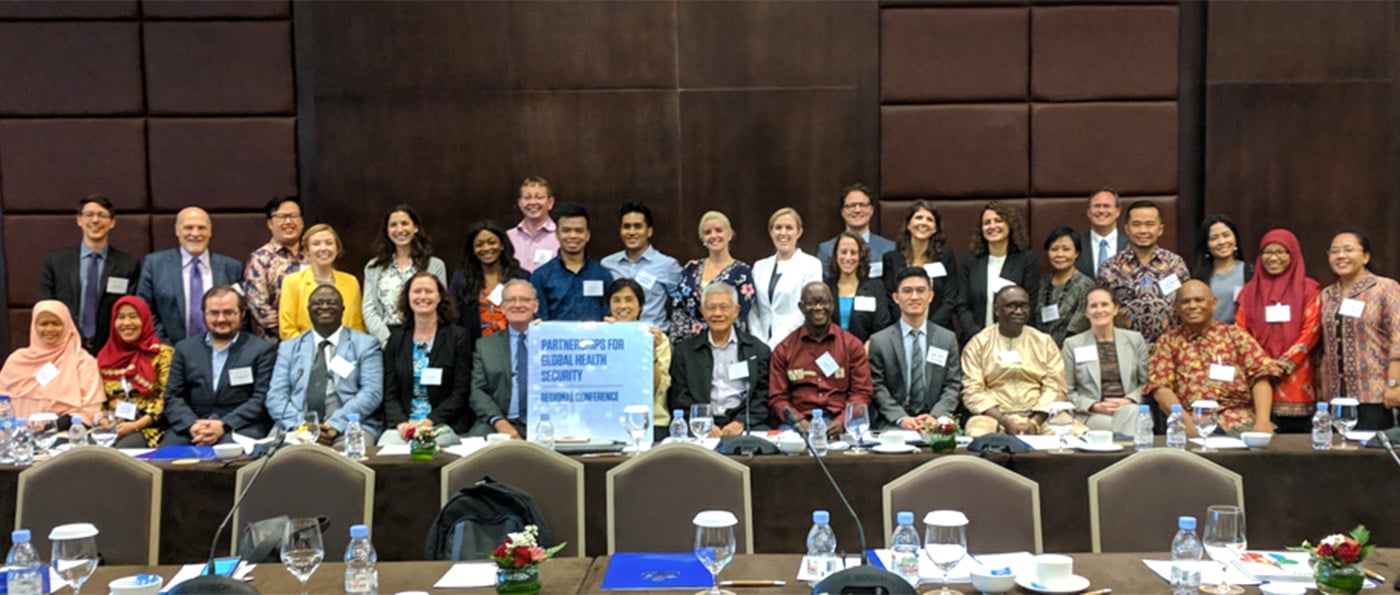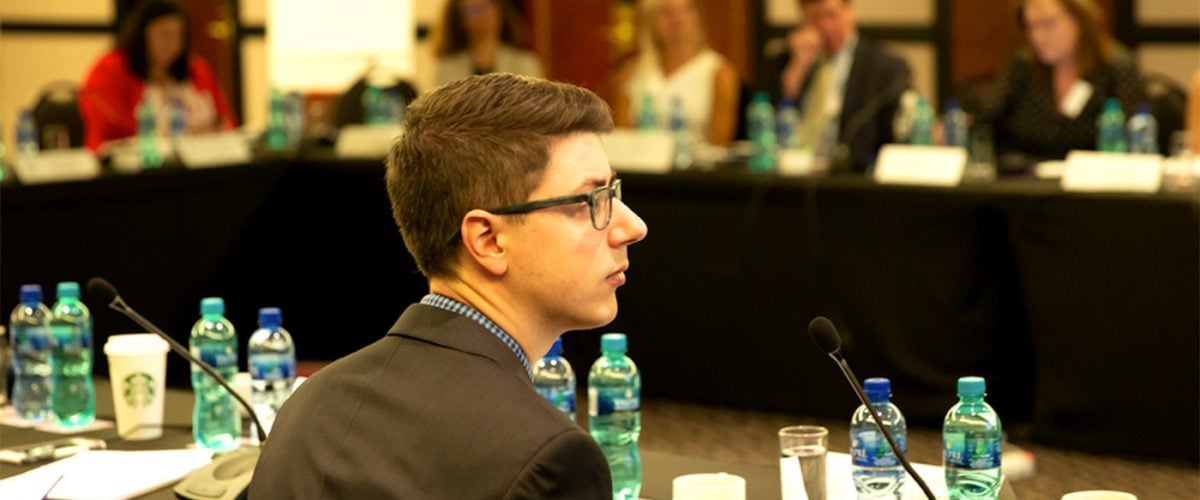Twenty-five infectious disease outbreaks prevented, detected or responded to overseas. These are among the triumphs experienced by Mark Lucera, PhD, a former CU Anschutz postdoctoral fellow who recently shared some of his global-health initiative stories with a campus audience.
Lucera now works at the State Department in Washington, D.C., as a foreign affairs officer for the Office of International Health and Biodefense (OES/IHB).
He spoke on campus about being selected for the prestigious American Association for the Advancement of Science (AAAS) Science & Technology Policy Fellowship (AAAS-STPF), which provided a launchpad for his meteoric ascent to his current position in what he calls the real-life version of the board game “Pandemic”.
Founded in 1973, the AAAS-STPF program places diverse, policy-passionate scientists directly into government positions. Current AAAS-STPF fellows, spanning ages 27-62, fill over 250 government positions per year across a wide variety of agencies, including USDA, NASA, NSF and Homeland Security. “They call the fellows program the mafia, and they’re not joking. I can’t attend a single event without finding one,” Lucera says.
AAAS fellows boast track records both inside government and in the private sector: past fellows currently hold top positions at the National Security Council, Bill and Melinda Gates Foundation, Merck, Biden Cancer Initiative, and presidential candidate and Senator Kamala Harris recently hired a past AAAS fellow to run her energy and environment policy. This list goes on.
“If you are passionate about communicating and doing science in a different way, the fellowship might be a good fit for you,” Lucera says.
A passion for preparedness
Lucera’s interest in infectious disease and public health began at Rensselaer Polytechnic Institute where he earned his BS and MS in biochemistry/biophysics and molecular biology. While a Virology PhD program working on HIV at Case Western Reserve University advanced his knowledge of infectious disease, it felt too focused.
 Lucera (back left) joined a gathering of experts from the United States, foreign governments and the private sector at a regional conference of the Partnership for Global Health Security. The group discussed the challenges, lessons learned and opportunities to build stronger partnerships in Asia.
Lucera (back left) joined a gathering of experts from the United States, foreign governments and the private sector at a regional conference of the Partnership for Global Health Security. The group discussed the challenges, lessons learned and opportunities to build stronger partnerships in Asia.
Lucera began a postdoctoral fellowship at CU Anschutz working in the division of infectious disease in February 2016, which coincided with the timing of the Zika virus outbreak. He remembers the chaotic feeling of the news reports: “No one was understanding where the virus came from,” he said. “Central America didn’t have a plan in place, and they weren’t sending samples to the U.S. I became hooked on the question of how we can work better with countries to stop disease outbreaks.”
While Lucera volunteered with the Postdoctoral Association, Denver Museum of Nature and Science and the Community-Campus Partnership during his time at CU Anschutz, his work with Project Bridge, a local organization that helps scientists communicate their research outside academia, was largely responsible for turning his passion for infectious disease prevention into a career in science policy.
Policy on an international stage
After being selected as an AAAS fellow, Lucera started his current position in October 2017 in OES/IHB, the branch of the State Department focusing on science diplomacy, more specifically policy focused on global health security. Lucera describes two main components of the office: a reactive team, which is working on Ebola outbreaks in Congo; and the proactive team, where Lucera and teammates work on, write, track and coordinate more forward-looking policies to address infectious disease threats with foreign countries.
As foreign affairs officer, frequent travel is a necessity for Lucera, including Italy in September and Switzerland for the World Health Assembly. At a 50-nation gathering in November, Lucera joined the U.S. delegation in Indonesia to finalize and adopt the next phase of the Global Health Security Agenda (GHSA), which he helped craft. Lucera explains, “Many countries find attendance cost-prohibitive or logistically difficult, so helping bring this many countries together over a shared interest was fascinating.”
Beyond international policy, Lucera also serves as point of contact for nonprofits and the private sector to bring together government and industry to fill gaps. This year, Lucera and team developed and executed meetings in Africa and Asia, bringing together stakeholders to discuss the value and challenges of Public Private Partnerships.
Consensus building for the common good
Coming from academia, Lucera was used to writing concisely, but says that for government work, brevity and “BLUF”-style writing – bottom line up front – are key. For example, Lucera helped develop an event to educate Congress on why global health security matters, and how investing in initiatives like the Global Health Security Agenda have been successful. He said, “Leaders are generalists, not deep experts on any one area like a scientist, so they need to be briefed on the most important points for their audience.”
While getting up to speed in his new position, Lucera said receiving feedback from others, called clearance, was especially helpful. Most communications and policy documents require consensus building – agreeing to speak with one voice. “In government, you very quickly learn to write collaboratively.”
While Lucera misses a few aspects of academic research – namely the freedom to set your own deadlines (“NOT the case in government,” he laughs) and the feeling of discovery in the lab – he doesn’t miss the erratic schedule or the persistent self-doubt (so-called “impostor syndrome”) that so frequently plagues scientists. His government colleagues are respectful of his academic experience and put a strong emphasis on work-life balance.
A foot in the door
For those interested in science policy as a career, Lucera says AAAS fellowships offer an entry point due to the high name recognition and trust in the program. The competitive program involves an arduous application and interview process that includes writing and defending a mock policy statement. To prepare, Lucera recommends that applicants diversify their writing – practice writing literature reviews in an op-ed style, for example. “I hate the word ‘networking,’” Lucera said, “but relationship building is a really important skill to hone if you’re interested in government work.”
When asked about his most humbling experience thus far, Lucera said, “None of the work has my name on it, but I see things in the news that I worked on; I see that outbreaks were stopped that would have killed people. I see stronger relationships being built with allies overseas because of my direct action. That’s a humbling feeling – contributing to something good that the United States did, because we are public servants.”
As a furloughed federal employee at the time of his seminar, Lucera was speaking in his personal capacity. For more information, or to apply to the AAAS-STPF program, please visit: www.stpf-aaas.org.
Guest contributor: Shawna Matthews, a CU Anschutz postdoc




